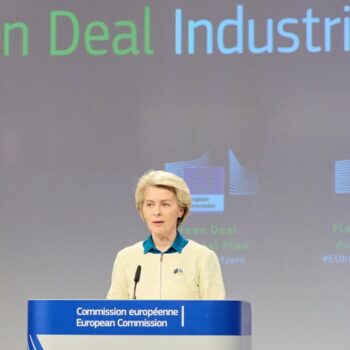The UK is riven by uncertainty following the vote to leave the EU and the energy sector is no exception. The extent and nature of UK participation in the EU internal energy market going forward could take years to resolve. Meanwhile, the economy has received a shock and the after effects are likely to persist for some time. A weakened pound will increase the cost of imported fuels and higher financing costs will drive investors to seek greater returns on infrastructure projects. Both of these will place upward pressure on energy bills.
Whilst energy is unlikely to take centre stage in the febrile politicking of post-referendum UK, Ofgem and officials and the Department of Energy and Climate Change will have a full agenda. It is not clear how previous policies can create a competitive and consumer focused market that keeps a tight rein on prices whilst setting out a credible pathway to deliver future carbon budgets. New thinking is needed.
Now is the time to place consumers front and centre of policy thinking and align their interests with the creation of a smart, flexible and low carbon energy system. If this can be achieved then we will not only have held a lid on costs whilst delivering domestic policy objectives but have ensured the UK becomes a leading 21st century economy able to compete in global markets for smart energy technologies.
The challenge is to ensure that buying low carbon energy and consuming it efficiently is the simplest and most cost-effective thing to do. This situation will not arise quickly. However, the important point to understand is that if we are going to harness the power of competition to drive the necessary transformation then this will not happen by stepping back and ‘letting the market decide’. ‘Price and pray’ will not work. The best way to promote competition at a time of change is through policies that actively create markets supported by measures to ensure the transformation happens at least cost and works in the interests of consumers.
Here is a four point plan for the UK Government:
Create markets
True competition requires markets that are populated by a range of businesses seeking to increase share through innovating and providing choices to consumers. Whilst there are businesses that are already offering exciting new products, these tend to be small and their growth is inevitably constrained by the ability to finance an expanding business. Larger incumbents are more reluctant to throw their weight behind new products and services, not least as a result of the strain this will place on often clunky back office systems.
Obligations have proved a powerful regulatory tool in the past to overcome the hurdles that prevent businesses offering new products to consumers – in particular, the installation of measures to improve energy efficiency – and there is much to learn from this experience. Cleverly designed obligations on energy suppliers could harness the imperative for least cost compliance to drive innovation in the products that will deliver a smart energy system. These obligations could focus simply on products that allow consumers to lower costs through adjusting consumption in light of short term energy prices.
Alternatively, they could embrace a more holistic 100% renewable approach with costs minimised not only through the procurement of the cheapest new renewable resources but through efficient, flexible consumption and the trading of new ‘storage’ products. This latter approach has the potential to inject new momentum into the growth of renewable energy resources without being mired in debates about ‘zero subsidy’ support mechanisms. Other market creation tools are available, most notably product standards, and these could be a powerful tool in ensuring that the development of flexible energy systems progresses in step with the deployment of electric vehicles and electric heating systems. However, such standards work best if applied internationally and it may be necessary for the UK to simply reflect the evolving systems of standards adopted for the EU internal energy market.
Consumer charter
We cannot achieve the next stage of the energy transition without consumers taking a more active role and this, in turn, demands the introduction of a new framework of rights and protections. Work is already underway to ensure appropriate data protection measures are in place and the obligations described above should be designed to ensure that all consumers have the right to access a range of new products. However, market creation measures will inevitably increase costs in the short term and these will be passed on to consumers – often to those who are more vulnerable and do not benefit directly from the new products. The mechanisms for cost recovery therefore need to be addressed to ensure fairness and equity across all consumer classes. Finally, it is vital that public messaging from Government and the regulator needs to shift from the ‘switch and save’ narrative towards one that highlights the benefits for comfort and convenience of adopting new smart energy technologies.
Market reforms
Market and regulatory reforms must focus on ensuring that businesses can compete in the new markets at least cost such that they ultimately become self-sustaining and without the need for imposed market creation measures. Many of the much needed reforms are already underway, including the deployment of smart metering and half-hourly settlement for all consumers. Genuine scarcity pricing and liquid intra-day trading are also important. However, new initiatives might also be needed. For example, new markets in the short term trading of storage products should be established. Grid access and charging mechanisms must also ensure suppliers have ready access to the cheapest renewable resources.
Industry governance
Investment in smart, low carbon infrastructure has the potential to provide a valuable economic stimulus and help fight recessionary forces, but sectoral silos and ‘predict and provide’ approaches are not fit for purpose going forward. In a financially-constrained country, new investment decision and delivery processes are needed to ensure money is not wasted on generation and network assets that would not be needed if there was more certainty over the emergence of efficient and flexible energy consumption. In particular, investment in the efficiency and automation of building needs to be treated as an infrastructure with finance allocated in line with other infrastructure priorities and clear responsibility defined for delivery. There is a crucial role to be played by cities and other local authorities in identifying local consumer needs and opportunities and in taking a lead role in delivering what is required.
It may be tempting to think that nothing has changed in energy policy and the old approaches can simply be rolled over to a post-referendum world. This is not correct. We will be facing new challenges, particularly around energy prices, and these demand a new policy agenda that places consumers at the centre of the market.
A shorter version of this article first appeared in UtilityWeek


